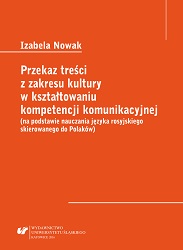Przekaz treści z zakresu kultury w kształtowaniu kompetencji komunikacyjnej (na podstawie nauczania języka rosyjskiego skierowanego do Polaków)
Transmission of culture‑related content in the development of communicative competence (on the basis of Russian language pedagogy directed to Poles)
Author(s): Izabela Nowak
Subject(s): Anthropology, Social Sciences, Language studies, Language and Literature Studies, Education, Foreign languages learning, Theoretical Linguistics, Applied Linguistics, Communication studies, Eastern Slavic Languages, Cultural Anthropology / Ethnology
Published by: Wydawnictwo Uniwersytetu Śląskiego
Keywords: transmission; culture; communicative competence; Russian language; pedagogy; Poles
Summary/Abstract: The work focuses on the transmission of culture-related content in the didactic process directed toward the development of communicative competence. The aim of the author is to investigate to what extent this question is reflected in language teaching materials intended to teach Russian as a foreign language. The first chapter presents opinions associated with Russian studies and the methods which are currently applied. The description is diachronic in nature and it constitutes a point of departure to present the basic questions in the communicative approach and to direct the attention of the reader to the problem of interculturality. This part of the work discusses both the role of the process of thinking, the place of the maternal tongue as well as the question of linguistic kinship as those factors which determine the acquisition of the Russian language by Poles. The second chapter familiarises the reader with the problem of competence, which was investigated from the linguistic, psycholinguistic and language teaching perspective. The focus of this chapter has to do with communicative competence, which is referred to the modern language pedagogy. Another aspect which is considered has to do with the differences in the development of competence in the maternal and the foreign language which are taken into account during the process of teaching the Russian language to Poles. The third chapter discusses the concept of culture conceived of as a universum and its relationship with language was analysed. The crucial problem of this part of the work is associated with the selection of cultural content in order to use it in the teaching of Russian as a foreign language. The author suggested the concept of the organisation of the material at whose heart lies the research term leksykultura [lexiculture]. The shared collection of values and beliefs which is manifested in this term is recognised as the basic and binding factor which constitutes lexiculture. It may be presented in the day-to-day communication of the native speakers of the Russian language; an important role is also played by the semantic surplus which manifests itself in the Polish-Russian intercultural relations. Subsequently the author analysed whether or not the assumptions that were accepted are reflected in the selected textbooks whose purpose is to teach Russian as a foreign language. The presence of lexicultures was analysed in the perspective of their selection, mode of introduction and methodical activities directed to the student. The material that was collected was subject to a qualitative and quantitative analysis. The purpose of this analysis was to reveal whether or not in the modern Russian language pedagogy the model of learning a language in strict reference to the communicative application of language is promoted. The approach toward the transmission of culture-related content in the process of teaching Russian that is presented in this work is an attempt at departing from the traditional research works. The centre of attention is occupied by communication as the superior factor which determines the approach to the teaching of culture-related content and treats the language learner as a subject whose initial perspective on the world and the system of values was shaped by his or her maternal language and native culture.
Series: Pedagogika, Dydaktyka
- E-ISBN-13: 978-83-8012-756-2
- Print-ISBN-13: 978-83-8012-755-5
- Page Count: 202
- Publication Year: 2016
- Language: Polish
- eBook-PDF
- Table of Content
- Introduction

